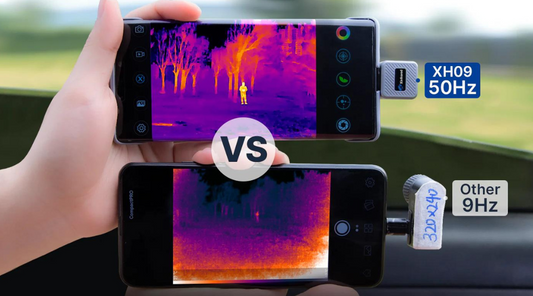Home Comfort Upgrade: Enhancing Insulation with Thermal Imaging
In the quest for creating a cozy and energy-efficient home environment, the role of insulation cannot be underestimated. Adequate insulation serves as a shield, keeping the outdoor weather at bay and maintaining a comfortable indoor temperature. However, identifying insulation issues can be challenging, often hidden behind walls and ceilings. This is where thermal imaging technology comes to the rescue, providing an innovative solution to assess and upgrade insulation efficiency.

The Importance of Home Insulation
Proper insulation acts as a barrier against external temperature fluctuations, ensuring that your home remains warm in winter and cool in summer. It not only contributes to a comfortable living environment but also plays a pivotal role in conserving energy and reducing utility bills. Traditionally, identifying insulation gaps relied on guesswork or invasive procedures. However, the thermal camera has emerged as a game-changing technology to assess insulation efficiency without disrupting the structure. By capturing heat signatures, thermal cameras reveal temperature variations across surfaces, pinpointing areas where insulation is lacking. Utilizing thermal cameras for insulation upgrades offers a multitude of benefits. From enhanced energy efficiency to improved indoor comfort, this method has the potential to revamp your home's insulation system while contributing to environmental sustainability.

Introducing Thermal Imaging Technology
A. Understanding Thermal Imaging Technology
Thermal imaging technology captures infrared radiation emitted by objects and converts it into visible images, where colors represent varying temperatures. This non-invasive technique enables us to identify temperature variations and locate areas of poor insulation.
B. How Thermal Imaging Cameras Detect Temperature Changes
Thermal cameras have specialized sensors that detect infrared radiation. These sensors generate images where warmer areas are depicted in brighter colors, while cooler regions are shown in darker shades. This enables homeowners and professionals to visualize heat leakage through insulation gaps.
C. Advantages of Using Thermal Imaging for Insulation Assessment
Compared to traditional inspection methods, thermal imaging is non-destructive and efficient. It allows for a comprehensive assessment of insulation effectiveness, enabling homeowners to address issues promptly.

Why Should Do Insulation Upgrades
A. Enhancing Energy Efficiency and Lowering Utility Costs
By identifying and rectifying insulation gaps, you can significantly reduce heat loss during colder months and minimize heat gain in the summer. This leads to lower energy consumption, translating into reduced utility bills.
B. Boosting Indoor Comfort and Temperature Regulation
Improved insulation ensures a consistent indoor temperature, eliminating cold drafts and hot spots. This contributes to a more comfortable living space for you and your family.
C. Promoting Environmental Sustainability by Reducing Carbon Footprint
Reducing energy consumption not only saves money but also reduces greenhouse gas emissions. Upgrading insulation aligns with eco-friendly practices, contributing to a more sustainable planet.

Conducting Thermal Imaging Inspections
A. Selecting Appropriate Inspection Conditions (Extreme Temperatures)
For accurate results, it's advisable to perform thermal imaging inspections during extreme weather conditions, such as very cold days or extremely hot days. This exaggerates the temperature differences between indoor and outdoor environments, making insulation gaps more noticeable.
B. Preparing Your Home for Inspection (Close Windows, Doors, etc.)
Before conducting the inspection, ensure that all windows, doors, and other openings are closed. This minimizes external factors that could affect the temperature readings.
C. Room-by-Room Thermal Imaging Scans
Systematically scan each room using the thermal camera. Focus on exterior walls, ceilings, and floors, as these are common areas where insulation issues arise. Note any temperature disparities and potential problem areas.

Analyzing Thermal Imaging Results
A. Identifying Cold and Hot Spots Indicative of Insulation Deficiencies
Cold spots indicate possible air leaks or insufficient insulation, while hot spots might suggest areas of excess heat transfer. These findings guide you to areas that require insulation improvements.
B. Distinguishing Insulation Problems from Structural Issues
While thermal imaging is excellent for insulation assessment, it's crucial to differentiate between insulation problems and structural issues that might cause temperature variations. Consult a professional to accurately diagnose and address any structural concerns.
C. Prioritizing Insulation Enhancements Based on Severity
Not all insulation issues are equal. Determine the severity of each problem and prioritize improvements accordingly. Severe gaps or leaks should be addressed first to maximize energy savings.

Insulation Upgrade Options
A. Adding More Insulation Material in Insufficient Areas
For areas with insufficient insulation, consider adding additional insulation material to improve thermal efficiency.
B. Replacing or Reinforcing Insulation Material in Problematic Areas
In cases of damaged or deteriorated insulation, replacing or reinforcing the material is crucial. Properly insulated areas contribute to a more balanced indoor environment.
Thermal imaging camera is a groundbreaking solution for enhancing home insulation. It empowers homeowners to improve energy efficiency, enjoy greater indoor comfort, and contribute to environmental sustainability. By upgrading insulation with the guidance of thermal imaging, homeowners can experience an upgraded living environment while reducing their carbon footprint and energy expenses.




